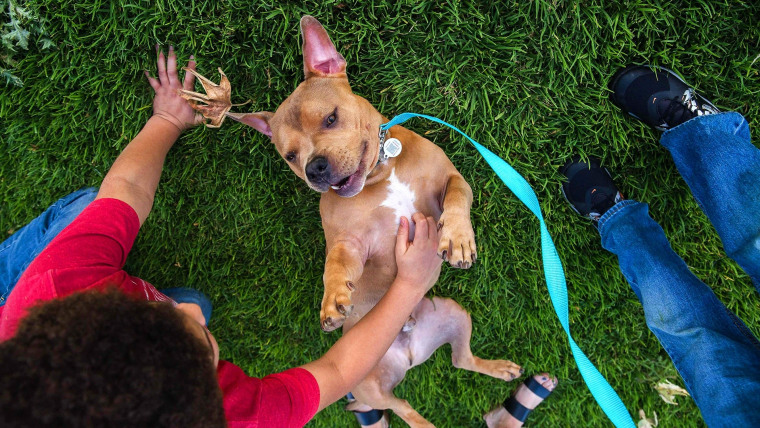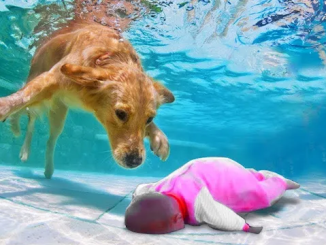Canine eggheads enjoy playing with toys and retrieving objects.

“Gifted” dogs, who have a rare talent for learning lots of words for objects easily, also turn out to be more playful than other dogs, a new study finds.
Prior research in humans has shown a link between playfulness and problem-solving abilities, so animal behavior researchers from Eötvös Loránd University in Budapest, Hungary, wondered if the same was true for rollicking pups.
What is a gifted dog? In the new study, it was Border collies who had proven in prior research that they were able to learn as many as 12 new words per week and then retain them for months.
To take a closer look at the possible association between giftedness and playfulness in dogs, Claudia Fugazza, a researcher in the university’s department of ethology (the study of animal behavior), and her colleagues asked the owners of 165 Border collies to fill out dog personality questionnaires. Twenty-one of the dogs were gifted and the other 114 were just randomly selected with no testing for word learning ability.
The surveys assessed the personality of the animals in five categories:
- Fearfulness, including fear of people, nonsocial fear, fear of dogs, fear of handling.
- Aggression toward people, including general aggression and aggression in certain situations.
- Activity/Excitability, including excitability, playfulness, active engagement and companionability.
- Responsiveness, such as trainability and controllability.
- Aggression toward animals, including aggression toward dogs, prey drive and dominance over other dogs.
For the evaluation of playfulness the owners were asked to rate their dogs in three areas:
- Dog gets bored in play quickly.
- Dog enjoys playing with toys.
- Dog retrieves objects, such as balls, toys and sticks.
The researchers focused solely on Border collies because earlier experiments found that the breed is more likely to be good at learning new words compared to others.
After collecting the survey responses, the researchers then compared the responses from owners of gifted dogs to those from the owners of dogs who had not been identified as gifted.
Playfulness was the only personality trait that was consistently different between the two groups.
It’s not clear from the study whether it’s the playfulness that helps the dogs learn more words, or whether the extra playful ones ended up with more opportunities to learn, said Fugazza, the study’s lead author, said in an email. That’s because gifted dogs tend to learn words for objects when their owners are playing with them.
Are playful dogs smarter?
Not exactly.
“Intelligence is the result of diverse cognitive traits that allow individuals to flexibly solve different types of problems,” Fugazza explained. “Giftedness refers to an extremely good capacity in the case of a specific skill.”
So, maybe gifted dogs are like people who score high on the verbal part of the SATs.
If your pup doesn’t learn words easily, it doesn’t mean it’s a dumb dog. Adam Boyko, an expert in canine genomics, reassures owners that canine intelligence is more than that.
“Both dogs and wolves are playful when they are puppies, but dogs really evolved to living in the human environment and to responding to social cues,” said Boyko, a specialist in the genetics of behavior and an associate professor at the Cornell University College of Veterinary Medicine. “It’s not surprising that the more playful ones exhibit better learning in the domain of learning human words. And it’s not surprising that Border collies, who are bred to respond to human cues, show the propensity to learn words more than other breeds.”

Other breeds of dogs might show intelligence in other ways, Boyko said. For example, wolves are very intelligent although they don’t typically pick up on human cues.
“But they can figure out how to escape,” said Boyko. “Where dogs would look for a person to help, wolves would see how humans did a latch and lock and then the wolves would do it themselves to get out.”
Boyko would like to take the study a step further and look at the genetics of the gifted dogs.
“This is a tantalizing correlation that might be meaningful if you are trying to build better service dogs,” he said.
One thing that can’t be determined from the study is whether the playfulness trait spurred owners to interact more with their dogs and thus teach them more words, said Dr. Nicholas Dodman, a professor emeritus at the Cummings School of Veterinary Medicine at Tufts University, CEO and president of the Center for Canine Behavior Studies and the author of “Pets on the Couch: Neurotic Dogs, Compulsive Cats, Anxious Birds and the New Science of Animal Psychiatry.”
Dodman said the study is interesting but needs to be replicated in a larger number of dogs.
“I would also like to see it done in a different breed,” he said.
The new findings might help people who want to buy or adopt a puppy. It suggests that playfulness might be a good attribute to consider.
“The playful ones might be more likely to interact with a person, assimilate words more easily and be more intelligent,” said Dodman.
Heartwarming Rescue: Heroic Efforts to Save an Elderly Canine Stranded on an Ice Floe in the Freezing River for Hours

“From Frigid Waters to a Warm Home: Lucy’s Remarkable Rescue and Heartwarming Reunion”

The initial days in a new home can be quite overwhelming for a rescue dog, often leading them to attempt to run away. Such was the case with Lucy, a recently adopted Labradoodle who managed to slip away from her new owner during a walk. Fortunately, locating Lucy didn’t take long, but bringing her back home proved to be a challenging task.
To everyone’s surprise, Lucy ended up stranded on a large piece of ice in the icy waters of the Detroit River. It remains a mystery how she got there, but there she was, clinging to the drifting ice with frigid water flowing around her. The situation was dire, with the risk of hypothermia looming if she remained on the ice much longer. Responding swiftly to the distress call, a team of Wyandotte police officers, firefighters, and animal control officers arrived to lend a hand.
Upon arrival, they found Lucy, trembling and drenched, lying on the ice. Determined to save her, they managed to maneuver the ice chunk closer to the riverbank. A firefighter bravely stood on a slippery, submerged ladder while his colleagues provided essential support by holding onto him with a rope.
“The poor pooch somehow managed to climb onto a chunk of ice but it was drifting away in the river while the dog was freezing,” the police department recounted.
During the daring rescue operation, one firefighter held a ladder against a nearby dock, while another descended it into the freezing water. With the help of a tool called a catchpole, they gently looped it around Lucy’s neck, carefully pulling her towards the ladder. Although the terrified pup had to endure a few seconds in the icy water, the firefighter held her securely in his arms.

Wyandotte Assistant Fire Chief Tom Lyon later described the heartwarming outcome, saying, “It had such a happy outcome. She just had those big brown eyes, and she couldn’t talk, but she probably was just so grateful.”
Lucy was promptly warmed up, and her worried owner was overjoyed to be reunited with her. After a thorough examination by a veterinarian, Lucy received a clean bill of health.
It’s safe to say that Lucy will be spending her days cozily wrapped in a blanket, basking in the warmth of her new home with her loving family.



Leave a Reply